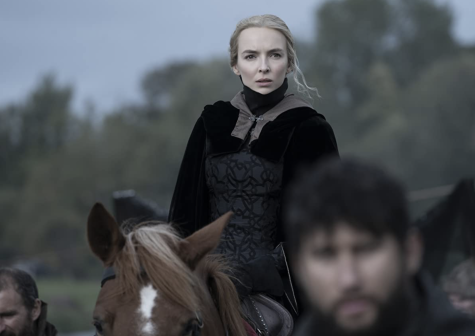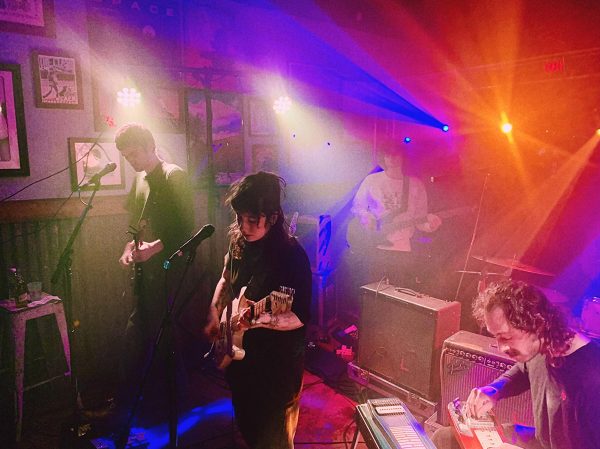REVIEW: ‘The Last Duel’ tackles 14th century gender roles in an intensely captivating and brutal historical drama
After directing plenty of polarizing films for the better part of the 2010s, filmmaker Ridley Scott breaks into the 2020s with “The Last Duel.” Scott’s handling of the historical epic feels like a return to form as he matches his eye for intricate detail, practical effects and exquisite production design with a brutal storyline that’s elevated by the performance of it’s cast. The film is about much more than a fight to the death with lances and horses, it’s the examination of honor and the expectations of gender roles in the 14th century; such themes feel terrifyingly relevant even today, especially in light of the Me Too movement.
Based on true events, in 1386, Sir Jean de Carrouges (Matt Damon) challenges his former comrade in battle turned rival, Sir Jacques Le Gris (Adam Driver) in a duel to the death. This declaration of battle comes after Carrouges’s wife Marguerite (Jodie Comer) accuses Le Gris of raping her while Carrouges was away being knighted. As news of the accusation rings out, Le Gris contests in a trial that he did not assault Marguerite. With Count Pierre d’Alençon’s (Ben Affleck) backing of Le Gris and gossip among noblemen and noblewomen, there is much difficulty in proving his guilt. Humiliated and enraged, Carrouges decides to battle Le Gris to death, even if it means that Marguerite may die. If Carrouges should die in the duel, regardless of whether or not Marguerite is telling the truth, she will face public punishment and be burnt alive.
Screenwriter Nicole Holofcener, alongside co-writers Damon and Affleck, crafts a balanced historical drama filled with procedural-like intrigue, questions of honor and the deconstruction of gender roles at the time. The film is much like a historical lesson, given that it adapts from the novel written by medieval literature specialist Eric Jager, which documents the event. The story and inciting events leading up to the duel are presented from the differing viewpoints of Carrouges, Le Gris and Marguerite, but only one of these is true as each account features their own subtle and obvious distinctions.

Through both Carrouges and Le Gris’s chapters, we witness the toxic masculinity that shapes both men into rivals. Carrouges is shown to be an honorable man in his own chapter as he relishes in his own glory in the battles he partakes in and the proudness he feels in having a beautiful and adoring wife that he views almost as an entitled achievement. But despite his courageousness, he’s patronized and ridiculed by d’Alençon, who admires Le Gris more, as he attempts to reclaim the land owed to him by birthright by suing the Count. In a generational blow, d’Alençon even gives away Carrouges’s rightful Captaincy to Le Gris, a role Carrouges’s family had held onto for multiple generations. Being a wrongful victim in blatant favoritism, losing out on a claim to power and the alleged assault on his wife strips Carrouges of his self-respect and much more to the point of desperation; hence his desire to duel. But as viewers will come to see, it becomes more evident that he’s out to reclaim his own honor as opposed to his wife’s.
On the other hand, Le Gris is seemingly in love with the image that admirers have of him and sees that being threatened by the accusation. His celebrity-like status in the film, when paired with the accusation, isn’t too far off from the dozens of real-life celebrities who have been accused of sexual misconduct or rape in recent years and have tried to preserve their image. The film does show the sexual assault onscreen before confirming whether or not it actually happened. The act is very discomforting onscreen as we see Le Gris verbally try to turn the assault into an act in the name of love, when it really seems like he’s trying to stroke his own ego as a womanizer and uphold his own gallant self-perception.
It’s through the eyes of Marguerite that one recognizes the flaws in the handling of sexual assault. Rather than being viewed as a genuine person by those around her, she’s dehumanized into being either a trophy or the subject of embarrassment and ridicule. Le Gris’s widespread admiration casts great doubt on her accusation, to the point where some jump to the conclusion of her being seduced by him rather than raped. Even a close friend of hers claims that to be the case after Marguerite privately admits to her that he’s attractive.

Bloody sword fights and intense battles are a highlight of this film as Scott continues to display the same knack for them that he’s had across his historical films, particularly “Gladiator.” The action sequences boast a feral and adrenaline-filled quality with stunning choreography that’s so grounded and brutal that one would think they were watching an immersive medieval documentary. These sequences are further elevated by Scott’s long-time cinematographer Dariusz Wolski, who produces fittingly gloomy imagery that lends itself to the action’s grittiness and greatly captures human emotion.
However, action sequences are only aspects of the dialogue-driven film. Even without much action, one can’t help but be engaged by the dialogue as many lines are thought-provoking and pack a punch that’s just as, if not more than, effective as any sword strike in the film. The dialogue may not be entirely accurate to 14th century vernacular, but it’s pulled off so convincingly by the performers that it becomes an afterthought that doesn’t take away from the film’s themes.
Damon gives a good performance as a man subjected to the test of toxic masculinity that decides to give in. Damon portrays an impatient nature within the character that ironically makes him seem more childish than manly as he seems oblivious to his wife’s feelings and so eager to claim some semblance of glory or accomplishment. Damon especially embodies this idea in the latter portions of the film when his character tries so disturbingly hard to regain his own controlling nature over his wife and his reputation after the assault.

On the other hand, Driver gives a commanding performance that feels like a dark subversion of the knight in shining armor. He portrays the chivalrous and noble nature of Le Gris so convincingly that viewers might actually search for details on screen that would disprove the accusation against the character. Driver’s charisma and physical features give credit to the character’s admirable perception. However, his features also contribute to the intimidation factor of the character when we catch a glimpse of his real nature. Especially his height as he desperately chases after the shorter Comer in the unsettling assault scene, or when he faces off against Damon in a vicious stand-off. This is one of many roles where Driver demonstrates fluidity with dynamic characters.
Comer gives the most important performance of the film in what could easily get her an Oscar nomination, if not a win. Comer trades in the dark humor and allure of her “Killing Eve” character for a more subdued and heart-wrenching performance. Comer’s performance feels like a flagship role for the Me Too movement. Her vulnerability and intelligence in this role acknowledges why sexual misconduct is still a problem today that needs to be confronted with careful consideration, and never with just simple assumptions about one’s character. Comer displays great strength in this role as a character who seeks to break from the expectations and forced romanticization that an insensitive and flawed society would force upon her in that time period.
“The Last Duel” is one of Ridley Scott’s most masterful and thought-provoking films in years. The historical drama immerses viewers into a harsh time period that presents themes that are still timely today. The high-caliber performances of this film, especially Comer’s, are unforgettable and elevate it to extraordinary and award-worthy heights.









